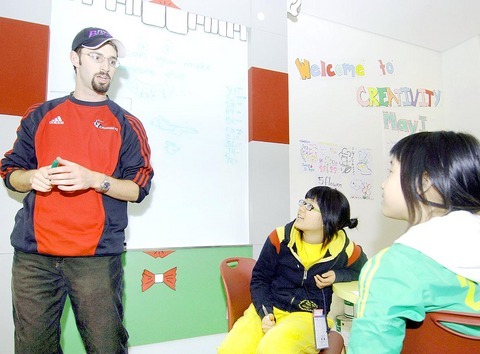Speaking Korean is not allowed at the Paju English Village, a huge English camp near Seoul, South Korea, that immerses its students in an all-English environment. But this is more than just a language camp. It is a real community made to look like an English village where hundreds of people live, eat, sleep, shop and learn.
The Paju English Village is built on a 277,000m2 piece of land, and is the world's biggest English immersion camp, boasting its own bar, bookstore, bakery, restaurant, bank, theater and even a city hall.
Electric buses drive along the main street, which branches off to classrooms and houses for 550 Korean students and 70 staff, as well as 100 teachers from various English-speaking countries. Korean is outlawed and even written signs are not allowed.

PHOTO: AFP
"We wanted to create an environment where students feel they left Korea behind," said Jeffrey Jones, head of the Paju camp.
Tens of thousands of young Koreans go abroad every year as they try to learn to speak English. In an attempt to reduce the outward flow, and to provide another choice for people who can't afford the trip, English villages are starting to appear across South Korea. Ten of these villages have already opened since 2004, and at least four more are expected to open soon.
Jones said the village allowed its Korean residents to speak in Korean only twice a day over meals, while making them speak English the rest of the time.
The Gyeonggi Province government, which owns the Paju camp, pioneered the huge immersion language program in South Korea by building the first English-only village in 2004 at a cost of 85 billion won (NT$2.88 billion). (AFP)
在南韓首爾附近的大型英語營「波州英語村」不准說韓語,讓學員沉浸在全英語的環境。不過這不只是一個語言營而已,它是一個打造成英語村的真正社區,有數百人在此居住、飲食、睡覺、購物與學習。
波州英語村佔地約二十七萬七千平方公尺,是全世界最大的英語營,以擁有酒吧、書店、麵包店、餐館、銀行、電影院,甚至市政府而感到自豪。
電動巴士沿著主要街道行駛,巷道內是教室及五百五十位南韓學生、七十位職員與一百位來自各英語系國家的教師的房舍。村內禁止使用韓語,連書寫的標語都不准。
波州英語營主任傑弗瑞.瓊斯說:「我們想創造一個讓學生將韓國拋諸腦後的環境。」
每年有好幾萬南韓年輕人出國學習英語。為了減少出國潮,提供負擔不起海外旅行的人另一個選擇,南韓各地開始出現英語村。從二○○四年開始,已有十家英語村開幕,短期內預計至少還有四家將開幕。
瓊斯表示,英語村只准許村內南韓人一天兩次用餐時說韓語,其餘時間都得說英語。
波州英語村隸屬於京畿道道廳。京畿道道廳在二○○四年斥資八百五十億韓元(新台幣二十八億八千萬元)打造了南韓首座全英語村,是南韓全英語學習計劃的先鋒。 (法新社/翻譯:賴美君)

US President Donald Trump has renewed his ambition to take control of Greenland for national security reasons and questioned whether Denmark has any legal right to the Arctic island. The debate has revived scrutiny of how Greenland became part of Denmark, its current self-rule and path to independence, and Washington’s military footprint. HOW DID DENMARK GET GREENLAND? Greenland was inhabited by Inuit peoples from Asia and North America intermittently from around 2,500 BC. Around 985 AD, Vikings led by Erik the Red settled in southern Greenland, farming and building churches. Around the same time, ancestors of today’s Inuit arrived, living as hunters

Have you ever gazed at the night sky and felt as though the Moon loomed larger than usual? Your eyes were not deceiving you. The Moon’s apparent size can __1__ subtly depending on where it is in its orbit. On certain occasions, it reaches its fullest phase while at its closest point to Earth. When these two events __2__, scientists and the public refer to the spectacle as a “supermoon.” The Moon does not orbit our planet in a perfect circle. Instead, it travels along a more oval-shaped __3__, completing one full orbit every 27 days. Consequently, there are times when

A: Aside from K-pop, what were the English chart-toppers? B: Billboard’s top three singles for 2025 were “Die with a Smile” by Lady Gaga/Bruno Mars, “Luther” by Kendrick Lamar/SZA and “A Bar Song (Tipsy)” by Shaboozey. Plus, pop diva Mariah Carey’s 1994 megahit “All I Want for Christmas Is You” won its 20th and 21st weeks at No. 1, becoming the longest-running No. 1 song in history. A: How about in Taiwan? The news says nine of the 10 most-streamed songs on Spotify Taiwan were Korean. B: Yup, and the top three were: “Winter Ahead” by BTS’ V and Park

AI-generated summaries are shaking up the media world. Tools like Google’s AI Overviews now provide users with direct answers above the search results, resulting in fewer people clicking on news links. For publishers who rely on that traffic to generate advertising revenue, this shift is hitting hard. The fallout is measurable. Many sites have seen a sharp drop in traffic since AI summary features rolled out. An analysis revealed that a news outlet that had once ranked first on Google lost up to 79% of its traffic when its link appeared beneath an AI-generated summary. Statistics also show that